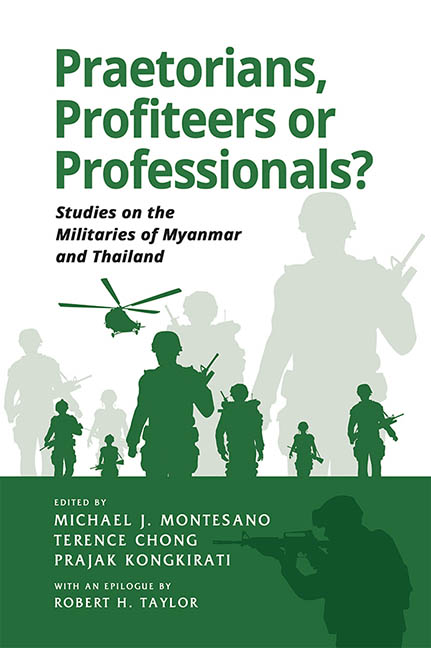Book contents
- Frontmatter
- Contents
- Acknowledgements
- About the Contributors
- 1 Introduction: Two Mainland Southeast Asian Militaries in Comparative Perspective
- 2 A New Tatmadaw with Old Characteristics
- 3 Thailand’s Military: Ideology and Sense of Mission
- 4 The Defence Expenditures and Commercial Interests of the Tatmadaw
- 5 The Economic Role of the Thai Military: A Commercial Logic to Coups?
- 6 Epilogue: Controlling or Playing Politics?
- Index
3 - Thailand’s Military: Ideology and Sense of Mission
Published online by Cambridge University Press: 09 October 2021
- Frontmatter
- Contents
- Acknowledgements
- About the Contributors
- 1 Introduction: Two Mainland Southeast Asian Militaries in Comparative Perspective
- 2 A New Tatmadaw with Old Characteristics
- 3 Thailand’s Military: Ideology and Sense of Mission
- 4 The Defence Expenditures and Commercial Interests of the Tatmadaw
- 5 The Economic Role of the Thai Military: A Commercial Logic to Coups?
- 6 Epilogue: Controlling or Playing Politics?
- Index
Summary
Ideology and sense of mission are, as reflections of the military mindset, fundamental to the shaping of military organization and behaviour—as that behaviour is directed either to guarding existing power structures or to changing them. The military mindset is a crucial element in gauging armed forces’ collective perception of their preferences and goals, especially vis-à-vis notions of democracy and civilian control. Military mindset informs and is informed by ideology, which itself then shapes the sense of mission.
This study examines Thailand's military through reference to its ideology, the historical context in which it has evolved, and its contemporary sense of mission. The study stresses the degree to which ideological legacies have shaped and socialized the Thai armed forces and thus informed officers’ understandings of their duties and roles in national life. These legacies have also served to clarify to military officers and to Thais more generally the fact that the country's military has a unique and serious political vision. The study argues that Thai military ideology has over time been constructed to rationalize the legitimacy of interventionism to rescue, defend and develop the nation, though variations in dogma relating to the prevailing cultural hegemony at different times in Thai history have also influenced this mindset (Gramsci 1971, p. 526). With an eye to maintaining its control over Thailand's hegemonic bloc, the monarchy has succeeded in dominating the armed forces by manipulating the values, beliefs and perceptions of soldiers and officers so that a monarchized worldview has become the socially accepted military ideology.
Thai military ideology, especially since 1980, has been a function of two related but sometimes countervailing conceptualizations. First, the armed forces are a “monarchised military” which acts as a guardian of and mechanism serving palace interests. Second, the military sees itself as the nationalistic arbitrator of Thai politics. It is in that role responsible for ousting or installing governments as it deems such intervention necessary to protect Thai national security and development, correlating with an identity centred on Buddhism, monarchy and “Thai-ness”.
But how has Thai military ideology evolved across time and to what extent has it become more cohesive?
- Type
- Chapter
- Information
- Praetorians, Profiteers or Professionals?Studies on the Militaries of Myanmar and Thailand, pp. 70 - 96Publisher: ISEAS–Yusof Ishak InstitutePrint publication year: 2020

